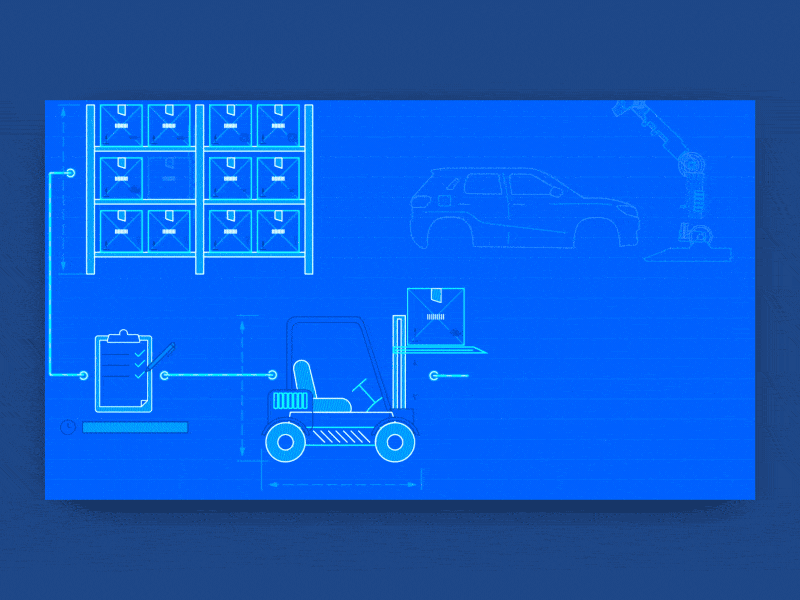
Illustration by Ranganath Krishnamani
At different levels, businesses strive to deploy transparency, fair trade, sustainability in customer purchasing decisions. However, complex and non-integrated supply chain networks make it difficult to implement these principles.
A large number of organizations have started incorporating Blockchain in supply chain management to make all processes more transparent and better-organized. According to Statista, 55.3 percent of logistics service providers state that they invested money in Blockchain technology in that area.
In this article, our experts will evaluate the real potential of Blockchain technology in supply chain management and consider use cases.
Today’s Supply Chain Challenges
Lack of end-to-end visibility
The lack of transparency can cause cost and customer relationship issues, which can negatively influence a brand name. Blockchain technology offers a solution that the product provides provenance tracking. The system participants, including suppliers, manufacturers, couriers, and end-customers, are permitted to access this information, which helps to establish trust between them.
Inefficient supply chain risk management
The company’s processes are usually exposed to different types of risks, such as fraud and code of conduct violations. Effective risk management programs are essential to effective supply chain management. Blockchain allows accurate product tracking, which helps predict many risks in the chain and lets all participants act appropriately.
Ripple effect due to extended value chain
Due to complex supply chains that are continuously extending, many organizations face significant variability risks. A few layers of stakeholders, including suppliers, distributors, and consumers, significantly increase the supply chain risk. Blockchain offers scalability through which any extensive database is accessible from multiple locations from around the world.
Sudden demand changes
The fastly-transforming environment needs businesses to respond to sudden demand changes on an increasing frequency rapidly. It requires a technology that could automate the processes and timely adjust them to changes required. Blockchain is the answer.
A powerful duo of Blockchain and the supply chain can help reduce errors, avoid product delays, eliminate fraudulent activities, and increase consumer/supplier trust. However, the benefits of Blockchain for the supply chain do not end here.
Extra costs caused by fraud or product duplicacy
Blockchain allows real-time product tracking, which helps significantly reduce the overall cost of moving an item in a supply chain. By strengthening the traceability, in situations such as product recalls or quality issues, companies can isolate a problem accurately, minimizing cost spend trying to locate its root cause.

Animation by Studio DOT
Blockchain Appliances in Supply Chain Management
Accurate tracking and traceability
Blockchain technology is often used to record product status at each phase of its lifecycle. It helps to track processes starting from the initial stage of production. For example, the world commercial giant Walmart actively utilizes this technology for monitoring sales of meat in China. And yes, it goes about each separate piece of meat.
The system shows where the meat comes from, processes each step of its journey to a customer, and records everything in the supply chain up to the sale date. Anytime the company can access information about who has sold the meat and who has bought it, what can be useful in peculiar cases.
Writing smart contracts
A smart contract is a program that utilizes Blockchain to execute the agreement. You can integrate smart contracts into your supply chain management to prevent fraud or other interference. It is a software program that uses Blockchain to execute an agreement. The program is stored on the Blockchain so the smart contract can only function according to its programming. The smart contract works only according to its programming and can automatically trigger specific events. For example, a product delivery recorded in Blockchain can trigger payment.
A smart contract also contains information about which participants can act on a specific type of data. For instance, a shipper can not register an item serial number mismatch, while a receiver can.
An excellent example of smart contract usage is Transactive Grid. This Blockchain-based application aims at tracking and redistributing power from solar panels in a neighborhood. An app allows automating the process of buying-selling of solar energy. The system is created on Ethereum, which is usually used for building smart contracts.

Illustration by UI8
Establishing trust
Establishing trust between all participants is key to the effective supply chain functioning. In a Blockchain, every participant has a copy of a ledger and knows where each item originated. Everybody has access to information about who has owned it before and when. A world-famous brand Nestle is a great instance of Blockchain in a food supply chain. It is already using Blockchain to monitor the provenance of food ingredients in many products.
On the other hand, Blockchain enables customers to see the provenance of goods — from the source point to end consumption what allows. It helps establish trust between a target audience and a brand.
Consensus and permission
Blockchain is often explained as “one version of the truth” for each product. It is a system of records that is aimed to capture proof of money transactions like bills of lading and money transactions.
It covers all stages of the supply chain – from serialization, and shipping to receiving and installation – each is tracked automatically. This system is absolutely built on principles of trust, transparency, and audibility.
All participants have access to the same information. In case, if one of the participants endeavors to perpetrate fraud, then he/she is automatically out of sync with a system and identified as a threat. It works as an effective deterrent to malware behavior.
Transparent transactions
Now all transactions can be maximally transparent anywhere in the world – no need to use traditional banking. Money transfers can be easily made between a payer and payee within a few minutes. You need not longer wait for days since with a Blockchain-based system, and everything happens much faster and safer.
Tomcar is an excellent example of this solution. This vehicle manufacturer uses Bitcoin to pay to its suppliers and makes all agreements with them based on standard terms. The benefit of using Bitcoin is in the cost savings.
Even though the company tries not using too much Bitcoin, it considers cryptocurrency as a great solution that allows significantly saves costs. However, cryptocurrency is international; some governments have started finding it as an innovative way for organizations to invest.
Monitoring of product conditions
Some kinds of products, like food or medicines, are susceptible and have specific needs. The product storage conditions, such as temperature, humidity, or vibration, can be recorded by sensors and stored on a Blockchain. If one of the parameters deviates from a norm, then it will be immediately tracked by the Blockchain participants. In this case, a smart contract can automatically solve a problem by triggering needed actions.
RFID Tags
Nowadays, companies actively use RFID tags to store information about products in supply chains. Commonly, they are automatically processed by IT systems and used for smart contracts in logistics.
RFID-tags for cartons or pallets preserve information about the location and date of delivery. Logistics partners use specific apps to search for these tags and bid for a delivery contract. The partner offering optimal price and service gains a deal. After this, a smart contract can monitor the status and final delivery performance.
Blockchain Traction in The Supply Chain
Many companies face the challenge of extraordinarily complicated supply chain management that also weakens other internal processes. However, Blockchain technology has the potential to solve significant glitches in traceability and surveillance along the chain. It enhances efficiency across all operations of the flow of goods, information about the storage and shipping of raw materials, delivering finished products from one point to another, and more. The results are a greater collaboration, streamlined inventory management, better asset usage, and more.
Sure, there are challenges to overcome in terms of cost factors and securing multiple stakeholder buy-ins, but Blockchain has the potential to provide a new and improved level of traceability to the supply chain.
Are you looking for how to optimize your supply chain management? Look no further. Our Blockchain experts will help you find the best solution for your business.



